Browse Exhibits (16 total)
Japan: Changing Years
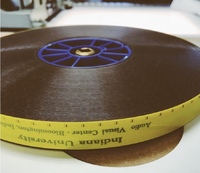
10 episodes, 1961, University of Michigan
From WNET:
"In 1941 Japan was our enemy. By 1951 she had become a staunch ally. Between 1861 and 1961 she made the leap from a Middle Ages culture to a modern one – a transformation that took most European countries four centuries to accomplish. Neither change occurred without tremendous political and social upheavals and enormous tensions and conflicts between the old and the new. In Japan: The Changing Years, these major changes and the resulting tensions are examined by experts who combine academic stature with first-hand knowledge of the country and the conditions they discuss. Films are used extensively to illustrate the points under consideration. These include historic footage shot in 1906 as well as a considerable amount of captured World War II film obtained from the U.S. Army or from the National Archives. Through the cooperation of the Japan Society, Inc., of New York (which shared the cost of producing the series with NETRC) antique prints and paintings and nineteen century photographs were obtained for use. Other still photographs were taken from the book We Japanese, published b Heibonsha of Tokyo. Much of the music was taken from Japanese radio broadcast tapes cleared for use by the Japan Society."
Red Myth
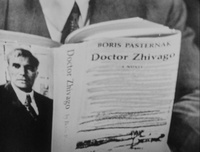
13 episodes, 1961, KQED (San Francisco)
From WNET:
"Thirteen half-hour programs from KQED in San Francisco describe the history of Communism, from Marx to Khrushchev, and explore some of the major fallacies in this system of thought. Each program contains commentary by noted historians and scholars, film clips of some of the historical events described, and re-enactments of other important episodes in the rise of Communism. Based on documents in the Hoover Institution of War, Revolution and Peace at Stanford University, the dramatic scenes are all adapted from the speeches and writings of the significant figures of the period – Marx, Lenin, Trotsky, Stalin and many others. The settings, costumes and makeup for the actors were carefully designed to reproduce with the utmost fidelity the figures and locations of the scenes they recreate, and were based on contemporary photographs and portraits in the archives of the Hoover Institution."
Tension areas
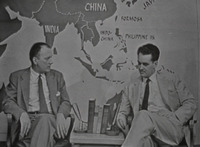
6 episodes, 1955, University of Michigan
From WNET:
"This is a series of discussions of vital "tension areas" in the Far East and their importance to the United States. Appearing as guest on each program is Albert Ravenholt, correspondent of the American Universities Field Staff and staff correspondent for the Chicago Daily News. Mr. Ravenholt is considered one of the nation's best-informed men on the Far East. Moderator for the programs is Dr. George A. Peek, Jr., assistant professor of political science at the University of Michigan. Other participants include Dr. John W. Hall, assistant professor of history and acting director of the Center for Japanese Studies; Dr. John W. Lederle, professor of political science and comptroller of the State of Michigan; Dr. Charles M. Davis, professor of geography; and Dr. Theodore M. Newcomb, professor of sociology and chairman of the doctoral program in social psychology, all at the University of Michigan. Important problems discussed are: Formosa, Hong Kong, the Philippine Republic, The Impact of U. S. Military Aid in the Far East, Chinese Minorities in Southeast Asia, and the Challenge of Rural Asia."
Prelude to the Presidency
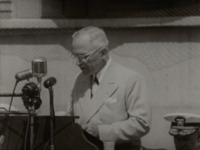
7 episodes, 1956, WQED (Pittsburgh)
From WNET:
"This seven program series, originating from station WQED, features top men in the political field in an overall depth study of American political procedures leading up to election of a president. A major portion of the first six programs are documentary in nature, employing narration and film clips from the National Broadcasting Company film Library in New York. Research materials for the series were prepared by Dr. William Keefe of Chatham College and Dr. Edward Cooke of the University of Pittsburgh. Dr. Albert B. Martin, director of the Citizenship Clearing House of Western Pennsylvania, serves as host for the series. Filmed interviews feature seven US Senators: Henry Cabot Lodge; James Farley, former national chairman of the Democratic Party; Mayor David L. Lawrence of Pittsburgh; and Dr. Elmer Schattsneider, head of the American Political Science Association. This series was financed by a grant from the Falk Foundation and the project was coordinated through the Citizenship Clearing House of Western Pennsylvania."
National Goals
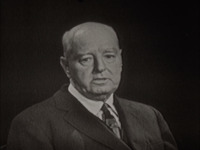
6 episodes, 1961, New York University TV
From WNET:
"In December 1960 a red-white-and-blue paperback book appeared across the country, the result of almost a year of hard work and thought by a commission that President Eisenhower and established to define the problems of the coming decades. The President’s Commission on National Goals published its finding in a series of brief analytical essays collected under the title Goals for Americans. This television series, NATIONAL GOALS, is based on some of the findings.
The members of the Commission did not set up these national goals in an arbitrary fashion. Rather, they analyzed the facts of our economic, political, and social structure, and the attitudes, opinions, desires, and needs of the American people; then they stated some of the problems that these suggest. The goals, the solutions to these problems, may well not be agreed upon. They serve as targets, for achievement, alteration, or rejection. The ultimate purpose of the Commission and of this series, in which some members of the Commission participate, is to simulate discussion by presenting the facts and some conclusions that can be drawn from them. Whether these goals are accepted or rejected, and how they are achieved – that must be decided by the American people."
Before there was a U.S.A.
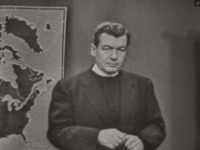
12 episodes, 1955, KETC (St. Louis)
From WNET:
"'Before there was a USA' is the history of Colonial North America. Reverend John Francis Bannon, SJ, Director of the Department of History at St. Louis University, is instructor for the course. Father Bannon, who has developed and enthusiastic response to this program in St. Louis, lists as main objectives of the series the following:
- To tell the story of Colonial North America so that viewers have a better understanding and a deeper appreciation of a period in American History which is intensely interesting and important.
- To show that human nature and human motives are basically the same in every period in history.
- To point out some of the contributions made to America by some of the nations in Europe."
The face of Sweden
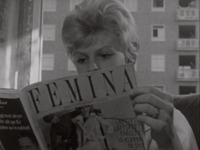
8 episodes, 1963, Swedish Institute for Cultural Relations and the Swedish Broadcasting Corporation for NET
From WNET:
"The face of Sweden illuminates the life and culture of Sweden. Each visual essay stands independently as a full consideration of a significant part of Swedish life, and each provides a key to the understanding of this small country and her people. The format for the series consists of voice over film, with occasional brief interviews. The content revolves about the central theme -- Sweden, a country where change is evolutionary and where moderation is characteristic. The series covers Swedish social politics, foreign policy, law, history, industry, culture and art. Among the distinguished persons who appear in the series are actress Ingrid Thulin and motion picture producer-director Ingmar Bergman (both in program6).
The series is admittedly a self-portrait. Its thesis as expressed by those involved in its production is summarized in the following four paragraphs.
Like the United States, Sweden has achieved a high standard of living while maintaining her concern for the preservation of democratic freedom and the dignity of the individual. In addition to material benefits, the population enjoys a remarkable degree of individual security. Poverty, unemployment and illiteracy are virtually non-existent.
Yet there are aspects of Swedish life and government that, on the surface, appear contradictory and have given rise to widely held misconceptions. It is commonly believed, for instance, that the high standard of living and the alleviation of social problems have been achieved through socialism and are therefore illusory benefits outweighed by a loss of individual freedom. Critics have attempted to prove that the country seethes with hidden social ills - a high suicide rate, mental illness, alcoholism, and illegitimacy.
The true picture is quite a different one. Sweden is ruled by a king, but her government is a constitutional monarchy. The Social Democrats have been the majority party of four decades, but they cannot operate without the support of coalitions in the minority parties. Furthermore, the country is a capitalistic democracy in which only three percent of the national industry is government controlled. That three percent is made up of primarily railroads, hydroelectric power facilities, and other public utilities that, in such a small country, do not offer reasonable returns to the private investor.
This series then explains from the Swedish point of view, the structure of the country’s society."
The essentials of freedom
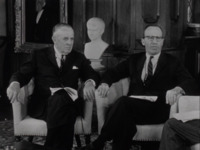
6 episodes, 1958, WOSU-TV (Columbus, OH)
From WNET:
"This series is based on a conference held at Kenyon College, Gambler, Ohio, last April; the full title of the conference was “The Essentials of Freedom: The Idea and Practice of Ordered Liberty in the Twentieth Century.” The college described the conference thusly: “The intention behind the conference was to help people to remember the underlying essentials of the free life; this intention could be achieved only by penetrating beyond the surface and the catchwords of our daily life to the spiritual principles and historical ideas which made Western, Christian civilization free as no previous or parallel culture has been free. The conference was thus not concerned with the eccentric but the central, not with the abnormal but the normal, not with the chaotic but with the organized and purposive concept of freedom.” The series was produced by WOSU-TV, Columbus, in cooperation with the Ohio State University department of photography. The producer was David H. Ayers, and the director was Robert Wagner."
American politics
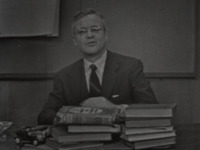
15 episodes, 1960, KETC (St. Louis)
From WNET:
"This 15-program series was first presented as a telecourse over station KETC and is produced for the Center by St. Louis in cooperation with Washington University. Designed to educate in the field of American politics, the programs cover the development of political parties, the theory and practice of party institutions such as the primary, the convention and the machine, and current political issues from the perspective of party record. Lecturer for the series is Thomas H. Eliot, chairman and professor of the department of political science at Washington University. Professor Eliot is a former US Congressman from Massachusetts and has had twelve years’ experience in Federal government administrative and legal posts."
Challenge of foreign policy
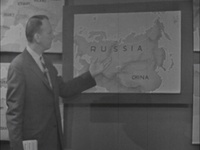
13 episodes, 1955, University of Michigan Television
From WNET:
"This series attempts to answer several vital foreign policy questions, which are important to the future security of the United States. These questions concern Russia, China, Indo-China, India, Germany, France, and England. Several outstanding authorities, such as New York Times correspondent Harrison Salisbury and Senator Mike Mansfield of Montana, are featured in programs throughout the series. The discussion format of each program is enriched by the use of numerous film strips, maps and pictures. Valuable insight into the social, political and economic factors which influence United States foreign policy in the key areas of the world is offered by this series. It was produced by the University of Michigan Television which employed John McGiffert, former CBS Staff writer, for this purpose."

